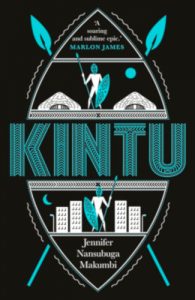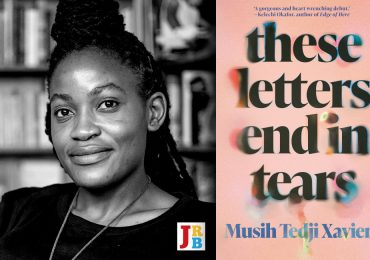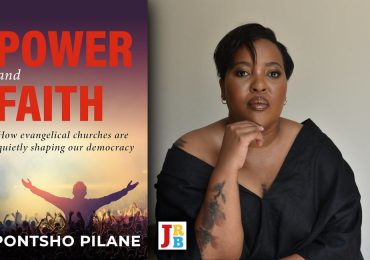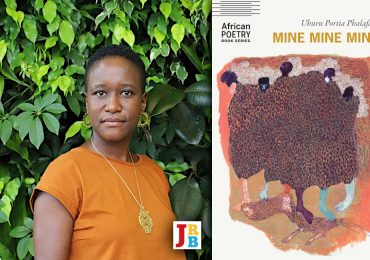Jennifer Nansubuga Makumbi is in South Africa in August to discuss her lauded debut novel, Kintu. She spoke to CA Davids about the novel as a European form, the unreliability of history, and why she refuses to write about colonialism.
 Kintu
Kintu
Jennifer Nansubuga Makumbi
Bloomsbury, 2018
CA Davids for The JRB: Congratulations on your success with Kintu, which has been deservedly lauded for its accomplished, beautiful writing, as well as for its utterly original storytelling. The structure in Kintu is complex, with five nearly distinct, finely populated worlds created; the macro story becomes entirely clear only towards the final section (at least for this reader). How do you think this composite structure benefitted the story you needed to tell?
Jennifer Nansubuga Makumbi: The structure of the novel came from the story itself, organically. It was the best way to tell it. The novel being a European form does not accommodate the multiple protagonists that a novel like mine, which does not adhere to Western individualism, presents in terms of family structures and multiple generations. This structure enabled me to present a range of characters and each with a complete world.
The JRB: From the first lines in the novel, when we read about ‘Kamu’s woman’, we feel that we are in a patriarchal world. As we delve further into the novel, and back into history itself, this patriarchy is constantly picked at, unpicked, challenged and subverted. This telling feels deeply honest, and I am curious about your research. How much did you do?
Jennifer Nansubuga Makumbi: I did quite a lot of research, but I didn’t set out to do it all at once as I didn’t know what I needed to research at the beginning. I let the novel direct me along the way. I would come to a part and realise I needed to do research and I did just that. I found that research had a way of taking over the story and you end up rewriting history, instead of writing the novel you set out to.
The JRB: What did the archives reveal in terms of gender relations and patriarchy, which feels more aggressively policed today than in your telling?
Jennifer Nansubuga Makumbi: The archives revealed the unreliability of history. Oral histories and much of the oral traditions were masculinist—female stories were suppressed. Most of the archives by explorers and missionaries were Eurocentric, and often racist. Early Ganda historians were nationalistic. All of them tended to manipulate history to suit their agendas. This made it easy and exciting and liberating to bring this history into fiction because, as you can imagine, within each history was a certain amount of fiction to start.
The JRB: In many ways, Kintu is an epic multi-generational family saga that traverses murder, incest, suicide, madness, transgender characters, homosexuality—the stuff of life, framed quite matter-of-factly. Some of these matters, however, are taboo, perhaps illegal in many of parts of Africa (and certainly many parts of the rest of the world). Did you feel concern at telling these stories in this way?
Jennifer Nansubuga Makumbi: No, I did not and still don’t feel any concern at all. I knew what I was getting myself into, but as a storyteller, the story is incomplete, it does not ring true when you censor yourself or leave things out that seem right. I tried to write most of these issues within historical and cultural contexts. Homosexuality, because it was before the arrival of Christianity, was matter of fact, but later it is absent, or you just suspect its presence. Incest is not articulated, it is unsaid. Sex is discussed before Christianity, but it is complicated, perverted in the present. I think this approach helped with the response, which has been largely positive.
The JRB: We know of the many positive responses to Kintu, but have there also been negative ones?
Jennifer Nansubuga Makumbi: Negative response has been mild. Just the usual labeling, ‘She wrote that because she is gay’, or, ‘She lives in Britain what do you expect?’ which is not intended for me, but for any person who might dare write about homosexuality.
The JRB: You don’t speak directly about the colonial period, but rather the entire novel seems to critique it obliquely, from the brutal dissection of Africa with arbitrary borders, to the questions of immigration, education and religion. Why did you choose this approach to the subject of colonialism?
Jennifer Nansubuga Makumbi: This was for many reasons. The one I cite most is that colonisation marginalises African concerns in an African novel, especially here in the West. I wanted the reader, whether in Uganda or in the West, to focus on my society. Kintu is about Buganda and Uganda. Besides, colonialism has been done and done and done. While Uganda was colonised differently from other countries, I didn’t think I would bring anything drastically new to the table, and I was not interested. Also, my primary audience was Ugandan and African. However, colonisation is huge historically, and the mere act of omitting it in a historical novel brings attention to the act. Moments that allude to it scream louder than if I had focused on it.
The JRB: Much has been said about the fact that Kintu was first published in Kenya, after having won the Kwani? Manuscript Prize; and that it was picked up a few years afterwards to be published in the UK and USA, as opposed to the usual route for most international top-selling African novels, which are first published off the continent. Do you think that we are on the cusp of a new way of publishing African literature?
Jennifer Nansubuga Makumbi: We are, but it is slow. What will determine the success of it is the market. If the market for novels grows, then we are heading in the right direction. But the market is not growing as fast as the production. Or, it is not awakening to the presence of this literature quickly enough. For example, my dream was that all my subsequent books would be published in Africa first and then travel elsewhere, but it has not been possible, because Kintu was published as a manuscript project rather than by a publisher who is established. The implications of that to a novel are enormous.
The JRB: Should we be publishing African literature in a new way?
Jennifer Nansubuga Makumbi:Yes we should. The West has too much influence on, and control of, our canon. The books they like—which tend to talk about Europe—are the ones they publish, which get reviewed, studied, written about in journals and which make it into the African canon. That is dangerous. We should wrench the power away from the West and determine our own canon, curated by African publishers and African reviewers.
The JRB: In which ways do you think the Windham-Campbell Prize from Yale University, which you were awarded earlier this year, will affect you as a writer?
Jennifer Nansubuga Makumbi: It has brought more attention to my writing around the world. It will also give me time and options, in terms of managing my career. Mostly, there is that confidence that comes with knowing that people you don’t know think what you are doing is wonderful and they are willing to invest in you.
- CA Davids is a writer and editor. Her debut novel, The Blacks of Cape Town, was published in 2014. Follow her on Twitter.






One thought on “‘We should wrench the power away from the West and determine our own canon’—Jennifer Nansubuga Makumbi talks to CA Davids about her novel Kintu”